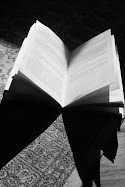"O poema da mente no acto de encontrar
Quanto baste. Nem sempre teve
Que encontrar:a cena estava montada, repetia o que
Estava no guião.
Então o teatro foi mudado
Para outra coisa. Seu passado era uma lembrança.
Ele tem que estar vivo,que aprender o discurso do sítio.
Tem que enfrentar os homens do tempo e encontrar-se com
As mulheres do tempo. Tem que pensar sobre a guerra
E tem que encontrar quanto baste. Tem
Que construir um novo palco. Tem que estar nesse palco
E,como um actor insaciável, vagarosamente e
Com meditação, dizer palavras que ao ouvido,
Ao mais delicado ouvido da mente, repitam,
Exactamente, o que ele quer ouvir, ao som
Das quais, uma audiência invisível escuta,
Não a peça, mas a si mesma, expressa
Numa emoção como de duas pessoas,como de duas
Emoções a tornarem-se uma. O actor é
Um metafísico no escuro,tangendo
Um instrumento, tangendo uma corda de metal que dá
Sons a passarem por súbitas exactidões,na totalidade
A conter a mente, abaixo da qual não pode descer,
Além da qual não quer elevar-se.
Deve
Ser o encontrar uma satisfação, e pode
Ser de um homem patinando, uma mulher dançando,
uma mulher
Penteando-se. O poema do acto da mente."
Quanto baste. Nem sempre teve
Que encontrar:a cena estava montada, repetia o que
Estava no guião.
Então o teatro foi mudado
Para outra coisa. Seu passado era uma lembrança.
Ele tem que estar vivo,que aprender o discurso do sítio.
Tem que enfrentar os homens do tempo e encontrar-se com
As mulheres do tempo. Tem que pensar sobre a guerra
E tem que encontrar quanto baste. Tem
Que construir um novo palco. Tem que estar nesse palco
E,como um actor insaciável, vagarosamente e
Com meditação, dizer palavras que ao ouvido,
Ao mais delicado ouvido da mente, repitam,
Exactamente, o que ele quer ouvir, ao som
Das quais, uma audiência invisível escuta,
Não a peça, mas a si mesma, expressa
Numa emoção como de duas pessoas,como de duas
Emoções a tornarem-se uma. O actor é
Um metafísico no escuro,tangendo
Um instrumento, tangendo uma corda de metal que dá
Sons a passarem por súbitas exactidões,na totalidade
A conter a mente, abaixo da qual não pode descer,
Além da qual não quer elevar-se.
Deve
Ser o encontrar uma satisfação, e pode
Ser de um homem patinando, uma mulher dançando,
uma mulher
Penteando-se. O poema do acto da mente."
-"Ficção Suprema"
- Wallace Stevens
- Wallace Stevens


